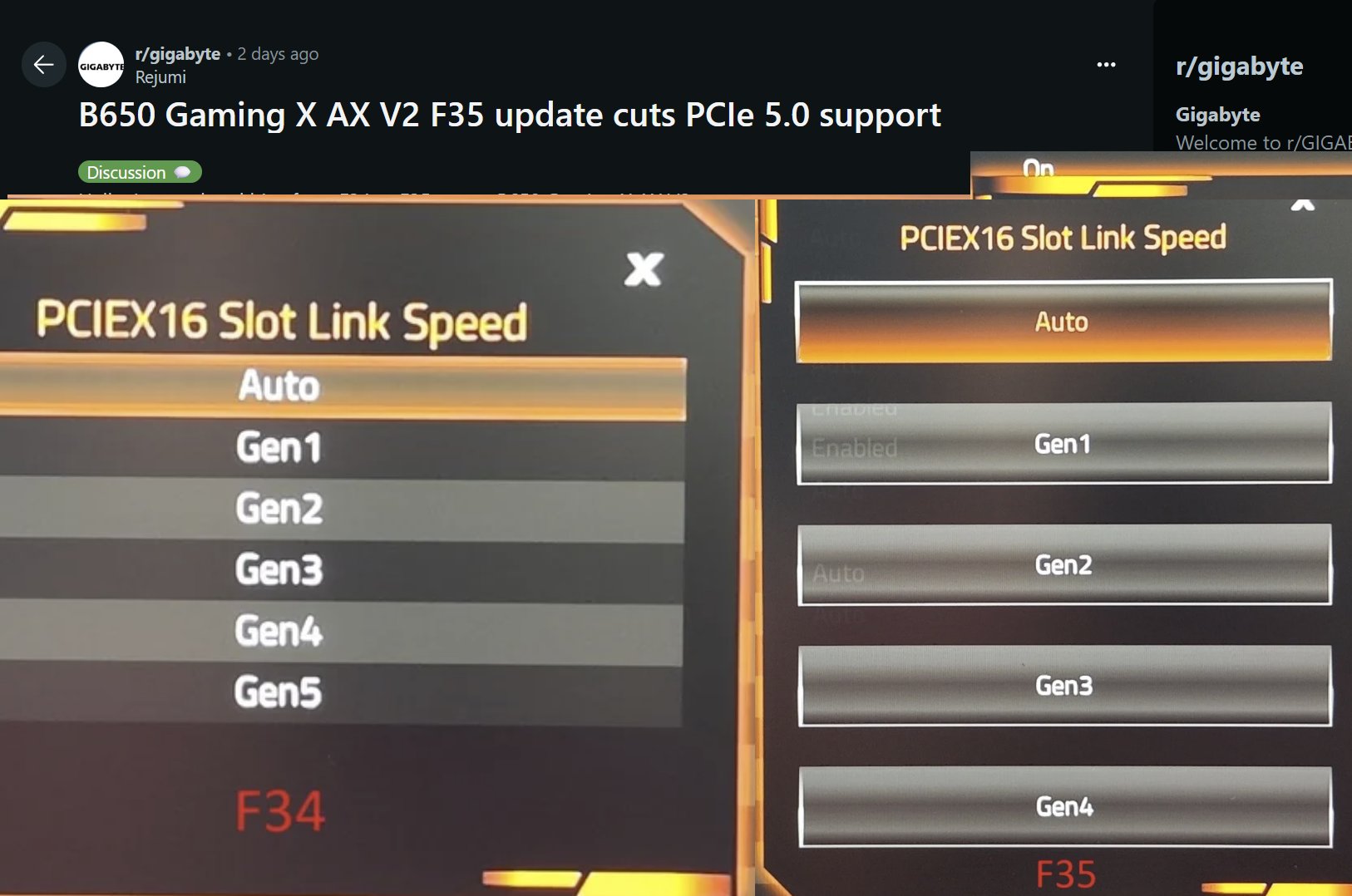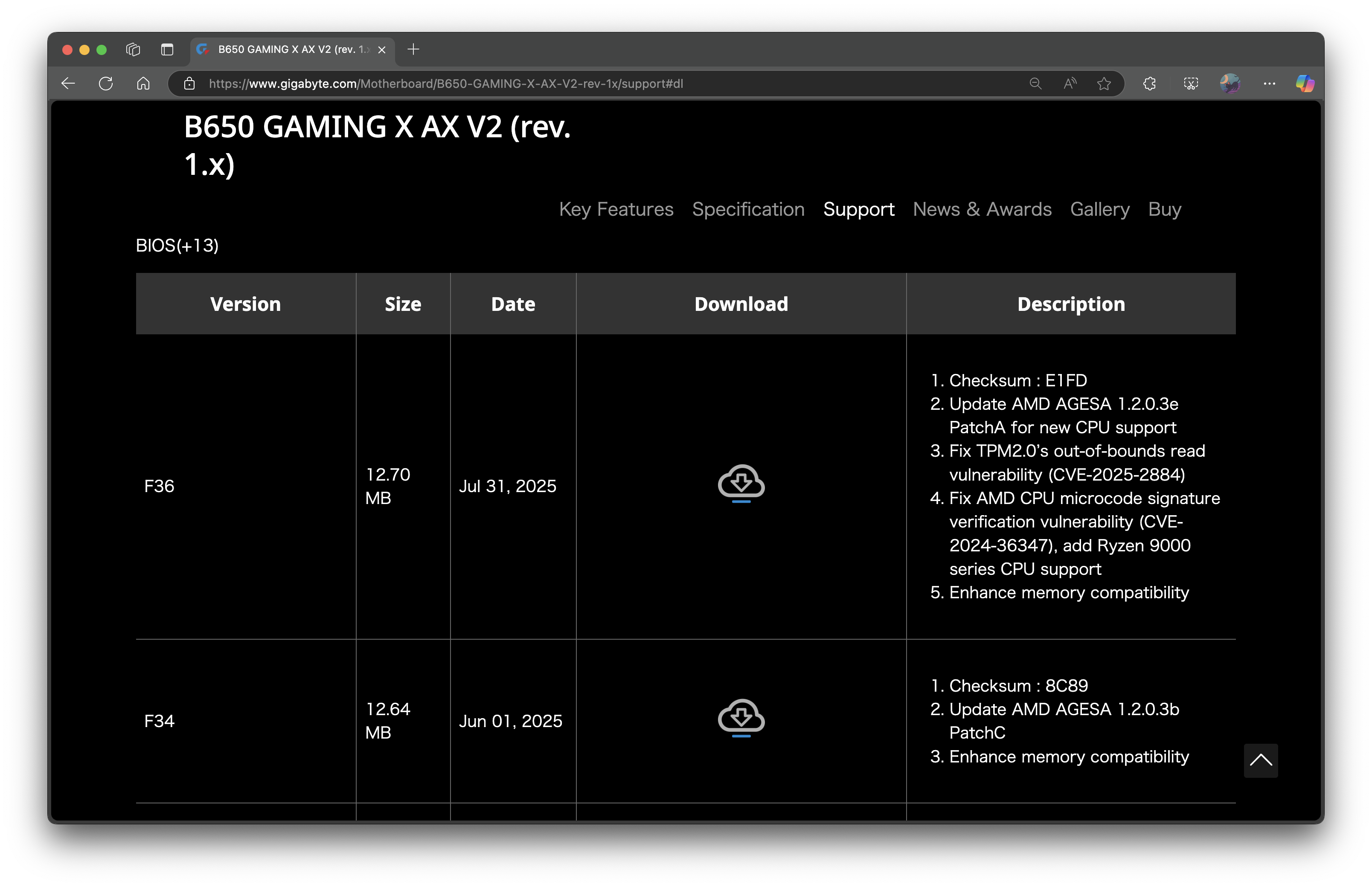Gigabyte quietly disables Gen5 PCIe 5.0 GPU support on B650 motherboards in F35 BIOS update — Stay on F34 if you value the unofficial PCIe 5.0 support
Stability issues cited as the reason.

Gigabyte has quietly removed an unofficial PCIe 5.0 option from its B650 motherboards with the latest BIOS updates. The change has sparked significant furor among enthusiasts who noticed the tweak after flashing their boards. This only affects the PCIe x16 slot reserved for GPUs, and not the x4 M.2 slots that Gen5 SSDs would use.
According to reports on Reddit and Chiphell, the removal first occurred in BIOS version F35 for models like the B650 Gaming X AX V2. Users who previously saw a “Gen 5” setting for the primary PCIe x16 slot in BIOS now found the option missing entirely, with link speeds capped at PCIe 4.0. Rolling back to BIOS F34 brings PCIe 5.0 support back, confirming this was a BIOS functionality change.
B650 Gaming X AX V2 F35 update cuts PCIe 5.0 support from r/gigabyte
Interestingly, Gigabyte never officially advertised PCIe 5.0 support for B650 motherboards. AMD’s specifications clearly limit full PCIe 5.0 capability to the B650E and X670E chipsets. However, because some B650 boards share PCB layouts with their “E” counterparts, the feature remained accessible—at least until now. Moreover, B650 boards do have 4x PCIe Gen5 lanes meant to serve an SSD but not enough for an actual Gen5 GPU.
So, why remove it? According to folks on Chiphell, enabling Gen 5 on B650 boards was causing stability issues for some GPUs. An MSI insider known as “Hugable Carrot” even suggested that other vendors may follow Gigabyte’s lead, calling PCIe Gen 5 graphics cards “too troublesome” on these mid-tier chipsets.
more user reports on gigabyte new bios that removed the support of gen5x16 from its b650 lineup.msi insider Hugable carrot (可以抱的萝卜) on chiphell claimed more vendors would follow this trend. the gen5 cards are just too troublesome.to be fair it seems gigabyte has never… pic.twitter.com/j2qIGphPcDAugust 2, 2025
However, the removal of this PCIe x16 slot feature wasn’t listed in Gigabyte’s BIOS changelog, and this lack of transparency has drawn criticism. The same Reddit user, who first reported this change, also shared benchmarks in his post showing a slight performance drop after updating to F35—losing 15 points in Steel Nomad and 3–5 FPS in games like Cyberpunk 2077 and Dying Light 2. While PCIe 4.0 x16 is more than enough for modern GPUs, issues can arise when bandwidth is halved to x8, which can significantly impact performance on low-end cards like the RTX 5060 Ti.
For now, Gigabyte has already pulled BIOS F35 from its support page and replaced it with F36, which likely keeps the PCIe 5.0 option disabled. If you value that Gen 5 toggle—even if it offered no real-world gains for most people—staying on F34 might be your best bet.

As highlighted by others, removing PCIe 5.0 from B650 boards likely comes down to stability and compliance. PCIe Gen 5 signals require stricter PCB design and higher-quality components to maintain integrity, which B650 boards weren’t officially validated for. Allowing users to enable Gen 5 could lead to unpredictable behavior, RMAs, and compatibility headaches—issues Gigabyte (and AMD) want to avoid.
Get Tom's Hardware's best news and in-depth reviews, straight to your inbox.
The bigger question is whether this sets a trend. If that MSI insider is correct, more vendors could start locking down “hidden” Gen 5 support on mid-range boards, reinforcing AMD’s segmentation between B650, B650E, and X670E chipsets.
Follow Tom's Hardware on Google News to get our up-to-date news, analysis, and reviews in your feeds. Make sure to click the Follow button.

Hassam Nasir is a die-hard hardware enthusiast with years of experience as a tech editor and writer, focusing on detailed CPU comparisons and general hardware news. When he’s not working, you’ll find him bending tubes for his ever-evolving custom water-loop gaming rig or benchmarking the latest CPUs and GPUs just for fun.
-
hotaru251 if it was merely "stability" they could of easily kept it as an option, but defaulted to 4.0 & warned of stability issue if toggled 5.0Reply
This is 100% removing a desired feature from a cheaper tier MB.
5060 runs 8x of 5.0Admin said:While PCIe 4.0 remains sufficient for most GPUs, the move highlights AMD’s strict chipset segmentation and could signal similar changes from other vendors.
there is actual testing that shows a 10%(ish) loss of performance by using it in a 4.0 slot over 5.0
This efefctively means your new & future gpu are all being gimped until you upgrade MB. The MB is one of the parts that "Should" last multiple gpu upgrades. -
UnforcedERROR Reply
If you wanted PCI 5.0 you should've been looking at the B650E or X670E. It wasn't an advertised feature, per the article.Unolocogringo said:Everyone who bought it should now get a refund.
Except that feature was never supposed to be there to begin with. As stated in the article:hotaru251 said:This is 100% removing a desired feature from a cheaper tier MB.
"Interestingly, Gigabyte never officially advertised PCIe 5.0 support for B650 motherboards. AMD’s specifications clearly limit full PCIe 5.0 capability to the B650E and X670E chipsets."
The dichotomy of cheaper boards is they are supposed to have less features. This feels like false outrage. -
hwertz I doubt it's a lower quality PCB (given the article saying some boards have an identical PCB between 650 and 650E boards... plus they wouldn't deliberately use uneven lengh traces would they?) Or components other than the 650 itself not being stable at Gen 5 speeds. I personally would prefer stability over gaining like 3FPS in CP2077 personally.Reply -
Alvar "Miles" Udell ReplyWhile PCIe 4.0 x16 is more than enough for modern GPUs, issues can arise when bandwidth is halved to x8, which can significantly impact performance on low-end cards like the RTX 5060 Ti.
Shouldn't there be an "even" between "performance" and "on"? -
bit_user Reply
That's only in extreme corner cases. Average performance difference should be only 1-2% and even less than that, in some games.hotaru251 said:5060 runs 8x of 5.0
there is actual testing that shows a 10%(ish) loss of performance by using it in a 4.0 slot over 5.0
TechPowerUp said:We are thrilled to report that running the GeForce RTX 5060 Ti with PCI-Express 4.0 x8 has an insignificant impact on performance. Averaged across all game tests, we see a 2% drop in FPS at 1080p, and an even smaller 1% drop at 1440p. While not exactly relevant to this GPU, even 4K Ultra HD posts only a 1% drop in performance with PCIe Gen 4 x8. This should be fantastic news for everyone who has the latest processors (Intel 12th Gen or later, AMD Ryzen 5000 or later), but with a motherboard that only supports Gen 4 on the main x16 PEG slot.
Source: https://www.techpowerup.com/review/nvidia-geforce-rtx-5060-ti-pci-express-x8-scaling/31.html
PCIe 4.0 x16 is fine, even for a RTX 5090.hotaru251 said:This efefctively means your new & future gpu are all being gimped until you upgrade MB. The MB is one of the parts that "Should" last multiple gpu upgrades.
TechPowerUp said:PCI-Express 4.0 x16 ... the RTX 5090. We are happy to report that performance loss in this mode is well contained, and you lose about 1% performance, across all three resolutions.
Source: https://www.techpowerup.com/review/nvidia-geforce-rtx-5090-pci-express-scaling/33.html
FWIW, I have an ASUS B650 board which never had PCIe 5.0. -
bit_user Reply
In the case of identical PCBs, I'd agree that it makes no sense. I'd guess why the cheaper boards don't support it is that they use fewer layers and lower-spec PCIe retimers.hwertz said:I doubt it's a lower quality PCB (given the article saying some boards have an identical PCB between 650 and 650E boards... plus they wouldn't deliberately use uneven lengh traces would they?) Or components other than the 650 itself not being stable at Gen 5 speeds.
Not sure where the article got the figure of 3-5 fps, but the biggest difference is at 1440p and that's just 1.8 fps (a reduction of 2.3% from PCIe 5).hwertz said:I personally would prefer stability over gaining like 3FPS in CP2077 personally.
Source: https://www.techpowerup.com/review/nvidia-geforce-rtx-5060-ti-pci-express-x8-scaling/9.html
The effect is even less at 1080p and 4k, making me wonder how noisy their measurements are. -
Amdlova The first Bios on my asrock H670 the Nvme from cpu support Gen 5.0Reply
Never tried to use. Gigabyte motherboards are so f. IF You don't look right they will push everything at Gen 3 -
techfreak Remind me of the days of Gigabyte Z68 Debacle they say such boards support PCIE Gen 3Reply
by BIOS update.
Some don't agree and now similar issue resurface guess Gigabyte is back to their dirty tricks.